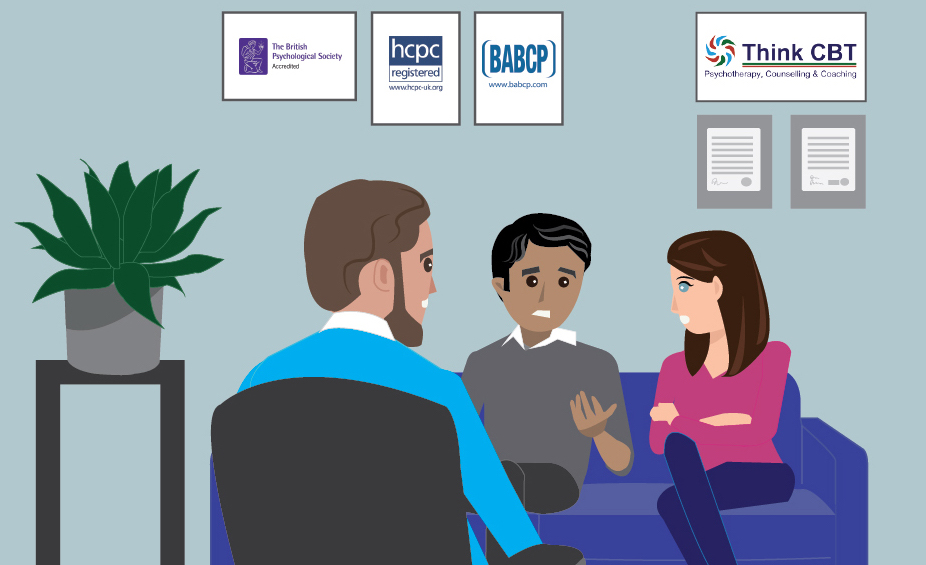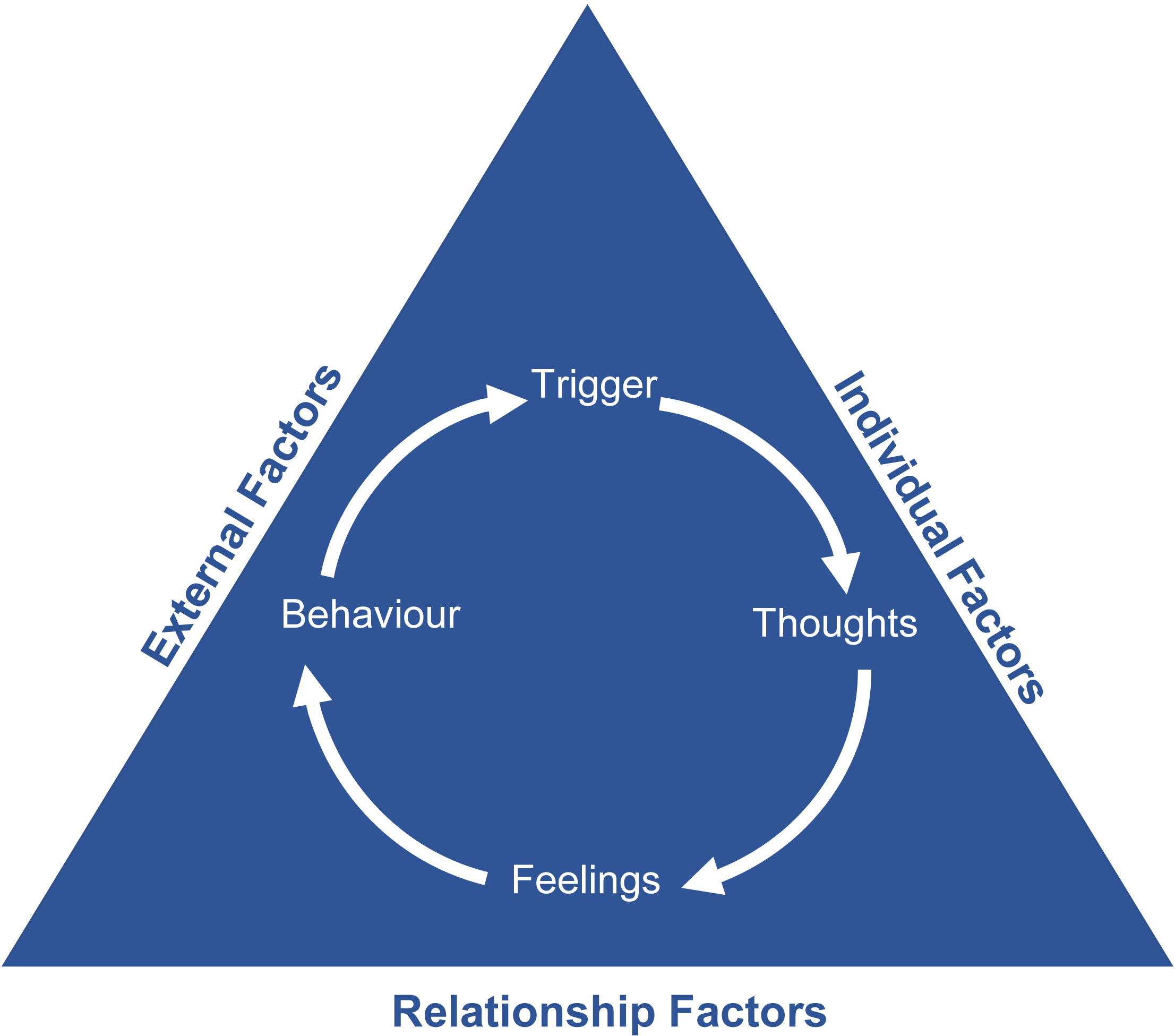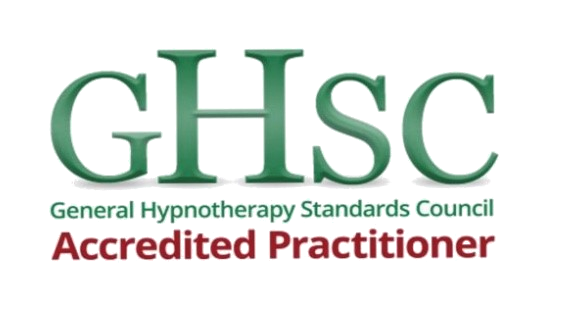CBT for Couples & Relationship Problems - London, UK-wide and Online via Video Link
Welcome to our CBT for couples and relationship problems page: If you are experiencing problems in your relationship including conflict, infidelity, avoidance, ambivalence, or abuse, we can help. CBT for couples can provide a structured and highly practical approach for resolving relationship conflict, improving communication or engagement and re-establishing emotional closeness. To arrange an informal call with one of our qualified and accredited Cognitive Behavioural Couples Therapists, complete the contact form on this page, call 01732 808626 or email info@thinkcbt.com
Relationship Problems
All relationships experience difficulties from personal problems, family pressures, finances, conflicts at home and work-related stress. Also as the personal needs of each individual change over time, couples can begin to drift or the relationship itself can fall into unhelpful patterns of ambivalence, resistance or opposition. These problems contribute to a separation rate of 40%-45% across all relationships in the UK.
Whilst it's appropriate for some couples to separate, working on relationship differences, conflicts and problems with emotional closeness, can significantly improve relationship satisfaction and well-being. CBT for relationships can help couples establish a new sense of purpose, trust, connection and fulfilment.
We provide Cognitive Behavioural Couples Therapy for relationship problems at various locations across the UK. We also have a network of qualified CBT specialists providing couples therapy online via video-link. Every member of our relationship therapy team has BABCP accreditation as a CBT expert and additional specialist training in Cognitive Behavioural Couples Psychotherapy.
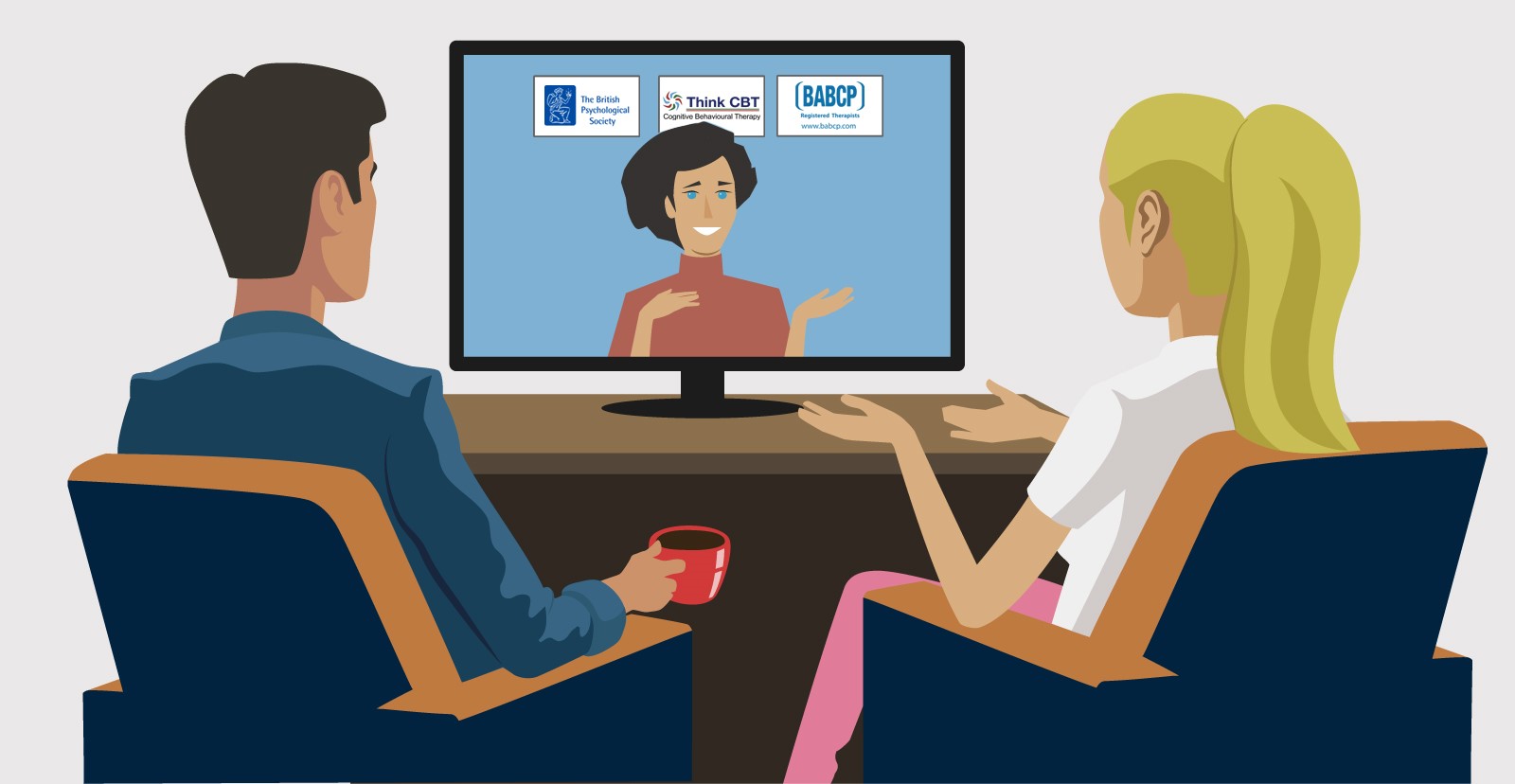
We offer online CBT for relationship problems. This is delivered via video link and works in the same way as face-to-face relationship therapy. The additional flexibility means that you can hold the sessions from the comfort of your own home without the usual travel or childcare constraints.
The appointments process is fast and easy to organise. We always start with an initial informal call to answer any questions and ensure that the approach is right for you before starting Couples CBT sessions. To arrange an informal call with one of our Cognitive Behavioural Couples Therapists, you can complete the simple contact form on this page, call our office on 01732 808626 or email info@thinkcbt.com.
Problems in relationships can also stem from individual issues with mental health or addiction. We therefore provide individual support often as a first step to engaging in Couples Cognitive Behavioural Therapy. If you are experiencing problems in your relationship and you are worried that they are linked to OCD related control or wider obsessional patterns, you can visit our specialist page on relationship OCD also known as ROCD here.
What Is Cognitive Behavioural Couples Therapy?
The Benefits of Cognitive Behavioural Couples Therapy
Cognitive Behavioural Couples Therapy has been shown to support improved emotional awareness, behavioural change, listening and communication skills, joint problem solving, conflict management, relationship resilience and the development of shared values.
Unlike some of the passive approaches to relationship therapy, CBCT focuses directly on the attitudes, skills, behaviours and emotional responses found in adaptive, fulfilling and resilient relationships. These benefits are not just anecdotal, extensive research conducted over the last twenty years has consistently demonstrated that CBCT can provide a practical and reliable approach for dealing with relationship disatisfaction, conflict, poor communication, emotional distress and crisis resolution in relationships.
Our Relationship Problems Specialists
How Relationship Problems Arise
Individual differences and disagreements are common in most relationships and the potential for friction and conflict is ever present. Where these relationship differences are not respectfully and assertively managed , communication breaks down, a negative emotional tone sets in and the focus shifts from partnership to resistance or withdrawal.
This can be maintained by a number of factors in the relationship. These factors include:
- a loss of positive emotional reciprocity; caring or doing less for each other.
- Unhelpful relationship demands or expectations from one or both partners.
- unresolved differences in attitudes and values.
- Communication difficulties and unhelpful communication patterns.
- Emotional or physical abuse.
- Resistance patterns involving cycles of persue-withdraw, attack-withdraw and withdraw-withdraw.
- Distructive or adictive individual behaviours that damage the relationship.
- Inappropriate relationship behaviours and infidelity.
Research by John Gottman a leading marital therapist, shows that the success or failure of a relationship can be predicted with 96% accuracy. This is based on the presence or absence of four types of hostile or destructive behaviours. These are referred to as the "Four Horses of the Apocalypse."
- Criticism: Attacking your partner’s personality or character, usually with the intent of making someone right and someone wrong.
- Contempt: Attacking your partner’s sense of self with the intention to insult or psychologically abuse him/her.
- Defensiveness: Seeing one's self as the victim and continuously warding off a perceived attack.
- Stonewalling: Withdrawing from the relationship as a way to avoid conflict.
These negative cognitive, behavioural and emotional patterns are the primary reason why now almost half of all marriages / committed relationships end in divorce or separation and why it’s estimated that a third of all couple’s experience relationship distress in the first three years.
Where Relationships Work
Despite the high potential for conflict however, healthy relationships persist in the majority. This is based on flexibility, compromise, positive reciprocity, open communication and mutual respect for the differences that each person brings to the relationship.
Strong and enduring relationships are defined by shared personal values, a mutual understanding of each other's needs and most importantly, the willingness to negotiate, adapt, tolerate and accept individual differences.
If you want to talk to a Cognitive Behavioural Psychotherapist about how CBT for couples can help you to strengthen your relationship, complete the simple appointment request form on this page and we will organise a free initial telephone consultation.
Couples CBT Assessments and Exercises
You can take our free confidential Couples Conflict Questionnaire and the ECR-S which can be used to provide an insight into your adult attachment preferences. We have also provided a free copy of our "Angels and Devils" worksheet freely available as a download. This exercise can be used to identify and resolve problems and differences in relationships.
The Cognitive Behavioural Couples Therapy Model
To help illustrate the interplay between individual, relationship and environmental factors, the CBT for couple’s model is drawn as a “butterfly” model. This shows how these interdependencies can maintain conflict and create a self-perpetuating cycle.
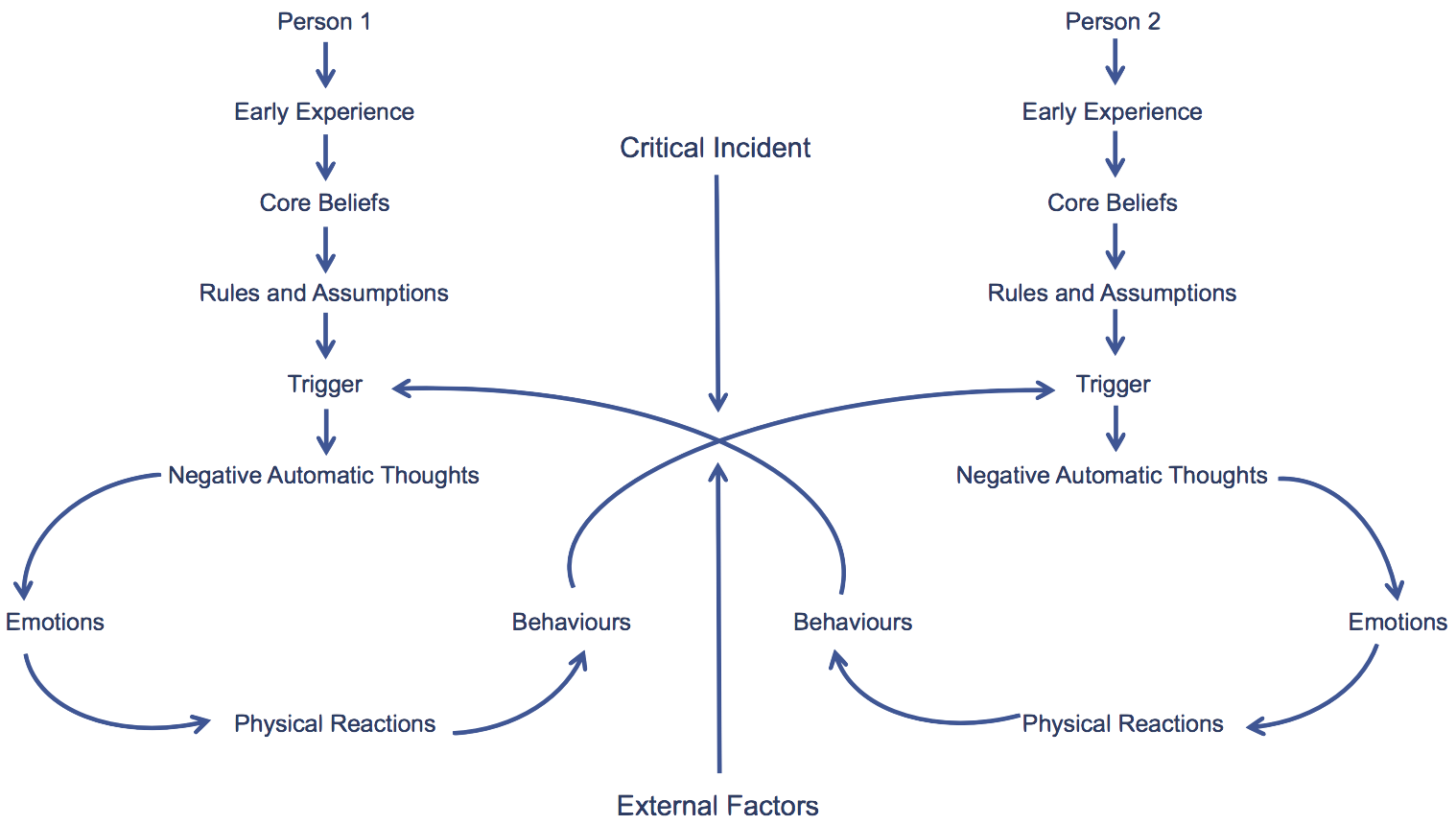 CBT for couples works by identifying and altering the reaction to triggers, relationship rules, automatic thoughts, distressing feelings and destructive behaviours that maintain this cycle.
CBT for couples works by identifying and altering the reaction to triggers, relationship rules, automatic thoughts, distressing feelings and destructive behaviours that maintain this cycle.
How the CBCT Process Works
There are six steps in the CBT for couple’s process. These steps are generally applied on a sequential basis, however they can also be used to specifically focus in on and tackle specific problems.
- Undertaking a joint assessment to identify and acknowledge individual problems, relationship conflicts, external factors and expectations.
- Agreeing shared goals and values to set direction and guide future relationship changes.
- Using the CBT for couples model to explore the interdependencies between external factors, triggers, thoughts, feelings and behaviours.
- Identifying and practising new cognitive and behavioural strategies based on shared values, mutual respect, empathy, trust and tolerance.
- Practicing joint communication and listening skills to support positive behavioural change.
- Agreeing a new "relationship contract". This expresses the key principles that each partner commits to, supporting behaviour change and continuity following the completion of couple’s therapy.
Conditions of Engagement in Couples Work
It is essential that couples engage in relationship therapy with a view towards reaching a constructive outcome or resolution. Couples will therefore be actively encouraged to adopt a positive emotional tone by opening to mutual feedback, listening, promoting positive behaviours and tolerating differences. Relationship resilience is developed by shifting the focus from criticism, contempt, defensiveness and avoidance, to a willingness to value, respect and tolerate each other's contributions and differences.
During your couples work, you will be asked to agree a time period over which you act as if the relationship is truly valued and worth every effort to improve and save. Any question of separation is suspended until the end of this time. As the CBTC model is based on developing resilient and fulfilling relationships, our approach is focused on staying together in a healthy, fulfilling and resilient relationship.
Sometimes however, it may be more constructive for a couple to separate on a temporary or permanent basis. This is usually because abuse, hostilities, risks or incompatibilities are significant and sustained. Under these circumstances, the focus of the work will shift to mediation in the interests of a safe, healthy and constructive outcome for both individuals. This may also involve an agreed referral to another service or agency to help with this process.
If you want to talk about starting Cognitive Behavioural Couples Therapy, please contact us on 01732 808 626 or email us at info@thinkcbt.com to organise a free and confidential initial discussion.

